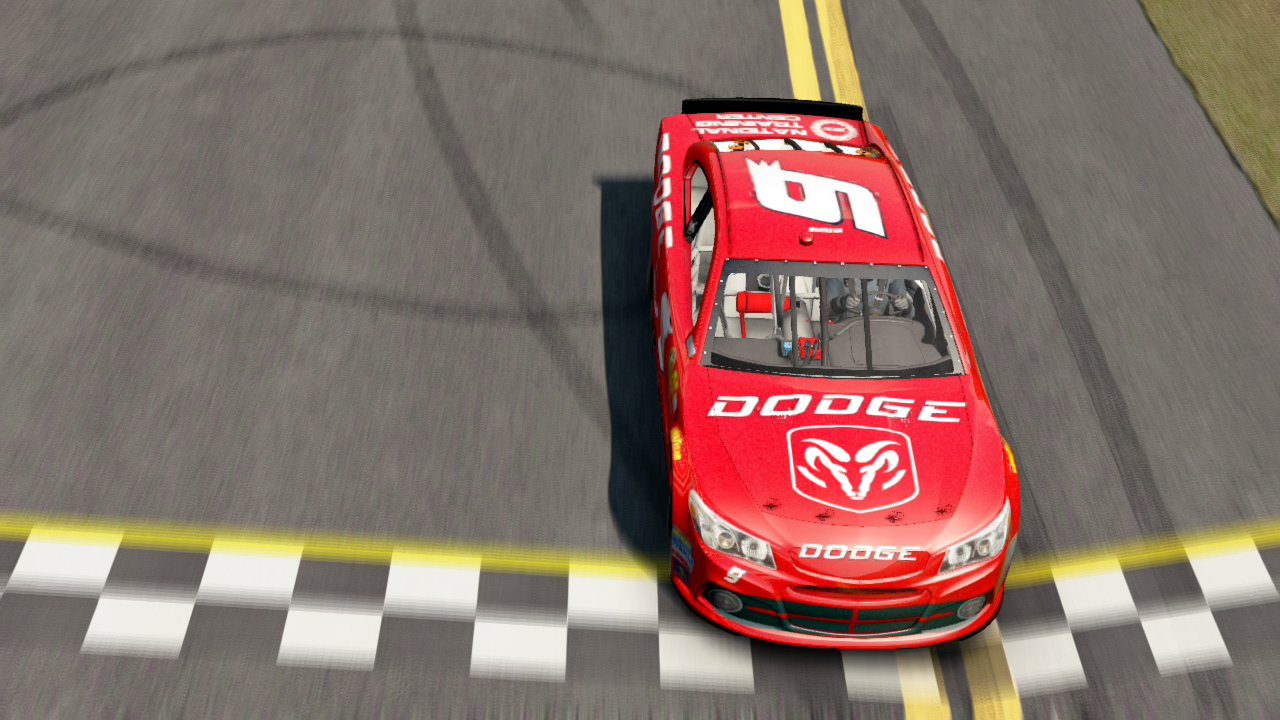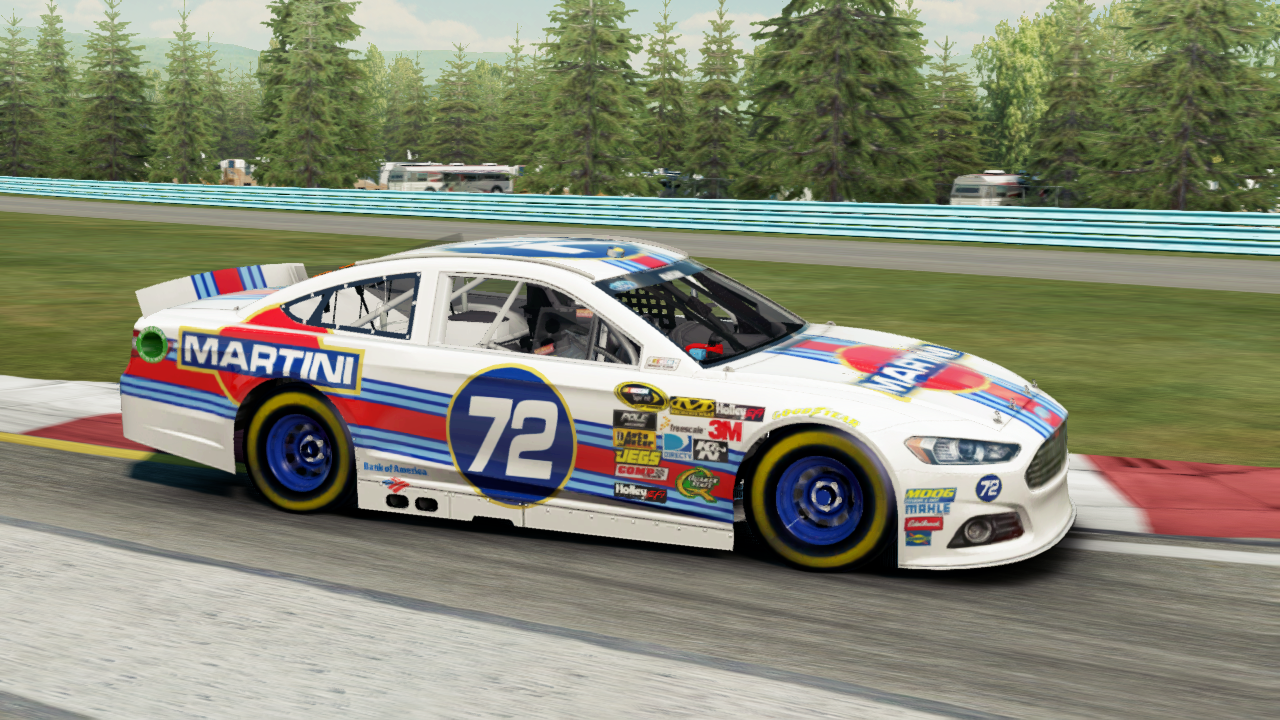For Fun: Valvoline #9 Ford
While messing around creating my NASCAR '14 Mark Martin Valvoline #6 paint scheme, I was procrastinating on trying to make a custom #6 that matched the style of the car I was going for. So I decided to take the Evernham Motorsports style "Flying E" #9 I used on Bill Elliott's and Jeremy Mayfield's Dodge paint schemes. Afterall, the #10 Valvoline car did briefly fall under the umbrella of the team. I mostly just wanted to see how it would fit, though. I think it actually works fairly well.
Mark Martin Valvoline #6 Ford Fusion - NASCAR '14 Custom Paint scheme
I finally got mostly done with my Mark Martin #6 Valvoline Ford from his Roush days. I always liked the classic look of the early #6, though some of his later schemes were pretty good as well. In this case, I used the game's default Valvoline logo on the hood, so it's not exactly the same as the one he used back then. I'm considering going through the effort to create my own custom one that will fit the color palette of the car a bit better, and have italicized text. Lastly, it may need some more work on associate sponsors, such as Pyroil or something else.
The #6 is a custom brush created from a lower case "g" with a few rectangles and curved bits added on to make it look smooth. Not my best effort, but I think it works in this case. I should also go ahead and create a dark blue duplicate for the headlight number.
The colored stripes are made from three distinct custom brushes where I worked out the approximate thickness I wanted for each color then overlapped rectangles. The first brush was used for the front of the car, and the second for the diagonal sides and top. The third was just another set to help transition the two by staggering the front rectangles to go along with the tilt of the diagonal stripes and blend in. I used a navy blue base for the rest of the car -- which should make the number icon appear white on navy.
The #6 is a custom brush created from a lower case "g" with a few rectangles and curved bits added on to make it look smooth. Not my best effort, but I think it works in this case. I should also go ahead and create a dark blue duplicate for the headlight number.
The colored stripes are made from three distinct custom brushes where I worked out the approximate thickness I wanted for each color then overlapped rectangles. The first brush was used for the front of the car, and the second for the diagonal sides and top. The third was just another set to help transition the two by staggering the front rectangles to go along with the tilt of the diagonal stripes and blend in. I used a navy blue base for the rest of the car -- which should make the number icon appear white on navy.
#21 Wood Brothers Citgo Ford Fusion
Some of my favorite cars have always been the old Wood Brothers Fords. In this iteration, I went with one I've done before - the early 1990s era Citgo Ford, as driven by Dale Jarrett and Morgan Shepherd. Probably the most famous appearance of this scheme was at the conclusion of the 1992 Daytona 500 where Morgan raced Davey Allison down to the line.. Of course, back then it was a Thunderbird. Nowadays it would be a Ford Fusion.
Davey Allison #28 Texaco Havoline Ford Fusion - NASCAR '14
It's such a classic, I had to add it to my NASCAR '14 stable. If I ever figure out how to get a proper metallic gold gradient going in these games, I want to tackle the earlier version of the car.
Like most classic paint schemes, this time around I'm embracing the current body styles rather than going through the effort to paint on some sort of Thunderbird styling. None of the current cars are really boxy enough to pull it off.
Like most classic paint schemes, this time around I'm embracing the current body styles rather than going through the effort to paint on some sort of Thunderbird styling. None of the current cars are really boxy enough to pull it off.
NASCAR '14 Paint Booth - #19 Evernham Dodge
After redoing Bill Elliott's #9 Dodge for the game, I figured it would make sense to make the other team car -- the #19 Dodge driven by Jeremy Mayfield.
Bill Elliott #9 Evernham Dodge - NASCAR '14
I decided to take a second crack at recreating Bill Elliott's #9 Dodge. This time I opted to use the Gen6 Chevy body, because I think it fit the Dodge style slightly better. I also took the time to add in the UAW secondary sponsorship to the car.
NASCAR Gulf Livery
Continuing on the theme of NASCAR Ford Fusions looking ridiculously similar to Aston Martin GT sportscars, someone requested I take a crack at the old-school Gulf Livery that some have been running recently. My first attempt looked a bit too close to the STP 43, so I got rid of most of the color along the side skirts as a compromise. I might post a few variations of this scheme until I'm satisfied with it.
NASCAR Martini Livery
Part of the fun of the NASCAR '14 paint booth is seeing if you can create custom schemes from other series. With the old school MARTINI livery making its return to prominence in motorsports in F1, WEC, and the Tudor United Sportscar series (owned by NASCAR's France family) I decided it was time for it to join our game. I went with the Ford Fusion, because it looks closest to a GT sportscar. Many have noted to similarity between the Ford front end and that of the Aston Martins. Maybe I should do a Gulf Livery next...
NASCAR '14 Talladega Setup
This is a modified setup based on changes between NASCAR The Game: Inside Line and NASCAR '14. The rear end has softer springs and drags more, but this allows for higher speeds in the 204-206 range if you can hang on to it. I increased the front sway bar on the advice of some racing companions to help keep it more stable in the draft. The left rear tire is running lower pressure to help with the restarts.
If you are planning on running a race where you will need to make pit stops, I recommend lowering the right side tire pressures to 60 PSI rather than running 65, so your pit crew won't automatically change right side tires if you don't need to change them or mess up the pressures in a 4 tire stop. You sacrifice a bit of speed, but save time on pit road.
In general, this is a fairly loose car that slowly gains speed, but won't win you many pole positions. It handles very well on the low line, and definitely has some pull coming out of turn 2 without needing to drift up any lanes. This is where its strength lies. It is optimized for the PS3, so it may need a few tweaks on X Box or PC.
Some people recommend starting out with the default Michigan setup and then plugging your numbers in. I view this as optional, but it certainly doesn't seem to hurt.
TIRES:
Front Left:
Cold Pressure: 35
Camber: 8
Caster: 6
Front Right:
Cold Pressure: 65
Camber: -8
Caster: 6
Rear Left:
Pressure: 25
Camber: 1.8
Rear Right:
Pressure: 65
Camber: -1.8
Front Toe-In: -1/4
Left Rear Toe In: -1/4
Right Rear Toe In: -1/4
SUSPENSION:
Front Left:
Ride Height: 10.0
Bump: 91
Rebound: 45
Spring: 350
Front Right:
Ride Height: 10.0
Bump: 91
Rebound: 19
Spring: 400
Rear Left:
Ride Height: 5.8
Bump: 40
Rebound: 15
Spring: 350
Trackbar: 14
Rubber: YES
Rear Right:
Ride Height: 5.5
Bump: 69
Rebound: 51
Spring: 240
Track Bar: 14
Rubber: YES
DRIVETRAIN AND AERO:
Gearing: Cog B
Brake Bias: 50
Steering Lock: 26.5
AERO:
Tape: 100%
Front Splitter: 2.0
Front Bias: 53
Left Bias: 52
Wedge: Whatever it says (Should be around 50.1)
FRONT & REAR SWAY BAR:
Front: 1350
Rear: 200
If you are planning on running a race where you will need to make pit stops, I recommend lowering the right side tire pressures to 60 PSI rather than running 65, so your pit crew won't automatically change right side tires if you don't need to change them or mess up the pressures in a 4 tire stop. You sacrifice a bit of speed, but save time on pit road.
In general, this is a fairly loose car that slowly gains speed, but won't win you many pole positions. It handles very well on the low line, and definitely has some pull coming out of turn 2 without needing to drift up any lanes. This is where its strength lies. It is optimized for the PS3, so it may need a few tweaks on X Box or PC.
Some people recommend starting out with the default Michigan setup and then plugging your numbers in. I view this as optional, but it certainly doesn't seem to hurt.
TIRES:
Front Left:
Cold Pressure: 35
Camber: 8
Caster: 6
Front Right:
Cold Pressure: 65
Camber: -8
Caster: 6
Rear Left:
Pressure: 25
Camber: 1.8
Rear Right:
Pressure: 65
Camber: -1.8
Front Toe-In: -1/4
Left Rear Toe In: -1/4
Right Rear Toe In: -1/4
SUSPENSION:
Front Left:
Ride Height: 10.0
Bump: 91
Rebound: 45
Spring: 350
Front Right:
Ride Height: 10.0
Bump: 91
Rebound: 19
Spring: 400
Rear Left:
Ride Height: 5.8
Bump: 40
Rebound: 15
Spring: 350
Trackbar: 14
Rubber: YES
Rear Right:
Ride Height: 5.5
Bump: 69
Rebound: 51
Spring: 240
Track Bar: 14
Rubber: YES
DRIVETRAIN AND AERO:
Gearing: Cog B
Brake Bias: 50
Steering Lock: 26.5
AERO:
Tape: 100%
Front Splitter: 2.0
Front Bias: 53
Left Bias: 52
Wedge: Whatever it says (Should be around 50.1)
FRONT & REAR SWAY BAR:
Front: 1350
Rear: 200
Subscribe to:
Comments (Atom)










































